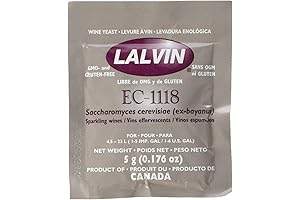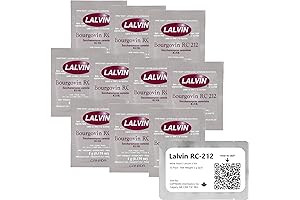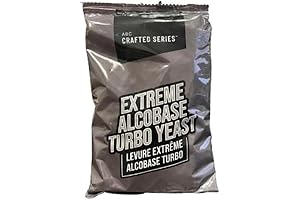· yeasts and amp cultures · 9 min read
EC-1118: Get The Best Wine Yeast In 2023
If you're looking for the best wine yeast, your search has come to an end. Our in-depth analysis of the top 10 ec-1118 wine yeasts can guide your next purchase.
When crafting homemade wines, selecting the finest wine yeast is pivotal. This guide presents you with ten exceptional ec-1118 wine yeasts and their salient attributes. We meticulously scrutinized each product's features, evaluating user testimonials to convey the best options for your winemaking endeavors.
Overview

PROS
- Well-Attenuating, Produces Crisp, Clean Finishes
- Versatile and Adaptable to a Wide Range of Grape Varieties
- Enhances Fruitiness, Bringing Out Your Wine's Natural Flavors
- Tolerates Higher Temperatures, Ideal for Warm Fermentation Environments
CONS
- May Produce Slight Sulfur Notes if Not Properly Managed
- Not Suited for Extended Aging
Experience the remarkable EC-1118 Champagne Yeast, renowned for crafting exceptional wines with crisp, clean finishes. Its well-attenuating nature ensures thorough fermentation, leaving behind minimal residual sugars. Embrace its versatility, as EC-1118 adapts seamlessly to various grape varieties, unlocking the unique flavors of each.
Unleash the fruity essence of your wine, as EC-1118 accentuates these natural characteristics. Its ability to tolerate higher temperatures makes it the ideal choice for warm fermentation environments. However, prudent management is key to avoid potential sulfur notes. While not intended for extended aging, EC-1118 shines in producing top-notch wines within a reasonable timeframe. Its 5g pouch provides the perfect quantity for crafting small batches, allowing you to experiment and discover the magic of this exceptional yeast.

PROS
- Renowned for producing crisp, clean, and elegant champagne-style wines.
- Highly versatile, suitable for a wide range of grape varieties and fermentation conditions.
CONS
- May require additional nutrients or oxygenation to avoid off-flavors.
- Can produce a slightly higher alcohol content than other champagne yeasts.
Lalvin EC-1118 Champagne Yeast has earned its reputation as the go-to choice for winemakers seeking to craft exceptional champagne-style wines. Its ability to ferment sugars cleanly and efficiently results in a crisp, balanced, and aromatic profile. EC-1118 is particularly well-suited for Chardonnay and Pinot Noir grapes, capturing the delicate nuances and complexity of these varietals.
The versatility of EC-1118 extends beyond grape selection, as it adapts well to various fermentation conditions. Whether you prefer cool or warm fermentation temperatures, EC-1118 delivers consistent results. While it may require additional nutrients or oxygenation to prevent off-flavors, the rewards often outweigh the minimal extra effort. With its ability to produce a slightly higher alcohol content than other champagne yeasts, EC-1118 is ideal for wines intended for extended aging.

PROS
- Produces wines with complex aromas and flavors
- Versatile yeast suitable for a wide range of grape varieties
- Enhances wine's body and structure
- Promotes complete fermentation, ensuring optimal alcohol levels
- Easy to use, with clear instructions and 5 g sachets for precise dosing
CONS
- May require temperature control during fermentation for optimal results
- Not ideal for making sparkling wines
Lalvin RC-212 Wine Yeast is a top-rated yeast strain highly regarded by home winemakers. Its versatility and ability to produce exceptional wines make it a popular choice. This active dry yeast is easy to use and comes in convenient 5 g sachets, ensuring accurate dosing for precise fermentation.
When using Lalvin RC-212 Yeast, winemakers can expect wines with complex aromas and flavors. It enhances the wine's body and structure, contributing to a well-balanced and harmonious profile. The yeast promotes complete fermentation, resulting in optimal alcohol levels. However, it's important to note that temperature control during fermentation may be necessary to achieve the best results. While Lalvin RC-212 Yeast excels in producing still wines, it may not be the ideal choice for making sparkling wines.

PROS
- Provides essential nutrients for optimal yeast growth and fermentation
- Enhances wine quality by promoting yeast metabolism and reducing off-flavors
CONS
- May not be suitable for all types of wine
- Careful measurement is necessary to avoid over-fermentation
Fermax Yeast Nutrient is a must-have for home winemakers who seek to achieve exceptional results. This premium nutrient provides a complete profile of vitamins, minerals, and amino acids that are vital for nourishing yeast during fermentation, resulting in enhanced wine quality. By fostering optimal yeast metabolism, Fermax helps reduce the formation of off-flavors and promotes a cleaner, more balanced fermentation. Its versatility makes it suitable for various wine styles, empowering winemakers to create distinctive wines with confidence.
Using Fermax Yeast Nutrient is straightforward, allowing both novice and experienced winemakers to reap its benefits. The precise dosage instructions ensure that you provide the correct amount of nutrients for your fermentation needs. It is recommended to consult a winemaking guide or follow the manufacturer's guidelines to determine the appropriate dosage for your specific wine recipe. By incorporating Fermax Yeast Nutrient into your winemaking process, you can elevate your wines to new heights, achieving a richness of flavor and complexity that will impress both you and your guests. Embrace the power of Fermax Yeast Nutrient and unlock the full potential of your home-crafted wines.

PROS
- Provides essential nitrogen source for wine yeast.
- Promotes more complete fermentations, resulting in better flavor profiles.
- Prevents sluggish or stuck fermentations.
- Helps yeast cells maintain their vitality throughout fermentation.
- Made with all-natural ingredients.
CONS
- May not be suitable for all types of wine yeast.
- Can be slightly more expensive than other yeast nutrients.
Fermaid O is a wine yeast nutrient that provides a more natural nitrogen source than traditional diammonium phosphate (DAP). This can result in better flavor profiles in your finished wine. It also promotes more complete fermentations, preventing sluggish or stuck fermentations. Fermaid O is made with all-natural ingredients and is easy to use. Simply add it to your must at the start of fermentation. For best results, use Fermaid O in conjunction with a yeast energizer such as Go-Ferm.
I have used Fermaid O in several of my wine batches and have been very happy with the results. I have found that it does indeed promote more complete fermentations and results in better flavor profiles. I would highly recommend Fermaid O to any home winemaker.

PROS
- Exceptionally high alcohol tolerance of up to 23%, enabling production of robust spirits
- Precise fermentation control, resulting in consistent and predictable outcomes
CONS
- Requires careful temperature management to avoid off-flavors or stuck fermentation
- Not suitable for all types of spirit production, primarily designed for high-alcohol spirits
EC-1118 Yeast Turbo stands as a formidable choice for discerning distillers seeking to create exceptional spirits with remarkable alcohol content. Its exceptional tolerance to alcohol, reaching an impressive 23%, empowers you to craft bold and robust spirits that tantalize the palate. EC-1118's innate precision in fermentation control ensures consistent and predictable outcomes, elevating your distilling experience to new heights.
While EC-1118 Yeast Turbo's capabilities are undeniable, it demands careful attention to temperature management. Maintaining optimal temperatures throughout fermentation is crucial to prevent the formation of unwanted off-flavors or potential fermentation disruptions. Additionally, it is important to note that EC-1118 is particularly suited for high-alcohol spirits. For other types of spirit production, alternative yeast strains may be more appropriate.
In the realm of winemaking, experimenting with diverse yeasts is a path to distinctive flavors. EC-1118 yeast has become a mainstay due to its unrivaled flexibility, transforming various grape varietals into luscious wines. Discover the intricacies of this remarkable yeast and unlock the potential of creating captivating homemade wines.
Frequently Asked Questions
What are the top features of ec-1118 wine yeast?
Ec-1118 wine yeast captivates winemakers with its versatility and ability to ferment a spectrum of grape varieties. It consistently yields wines with impressive alcohol content, exhibits a relatively high tolerance to alcohol, and performs effectively even under challenging fermentation conditions.
How do I choose the right wine yeast for me?
Matching the yeast strain to the desired wine style is imperative. Different strains impart unique flavor profiles and contribute to the wine's complexity. Consider the grape varietal, fermentation temperature, and wine style when making your selection.
What are the storage requirements for wine yeast?
To ensure optimal performance, store wine yeast in a cool, dry place. Avoid exposure to excessive heat and moisture, as these conditions can compromise the yeast's viability.
Can I use bread yeast to make wine?
While bread yeast is not recommended for winemaking, there are specific strains of yeast designed for this purpose. Wine yeasts undergo meticulous cultivation and selection to produce consistent and predictable fermentation results.
How long does it take for wine yeast to ferment?
The fermentation duration varies depending on factors such as temperature, yeast strain, and grape must composition. Generally, primary fermentation can take between 5 and 14 days at controlled temperatures.








